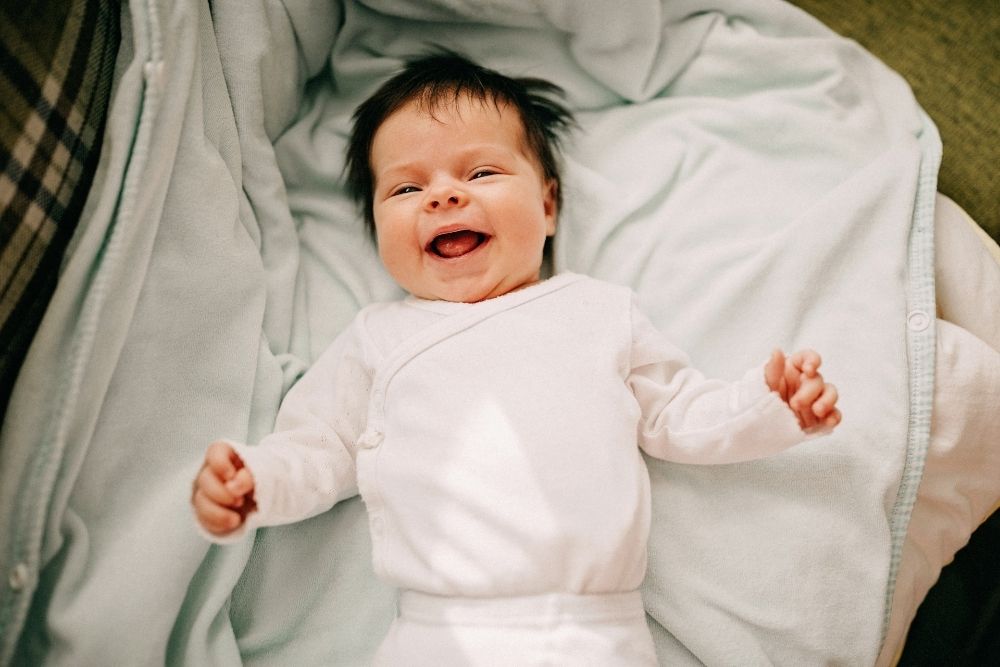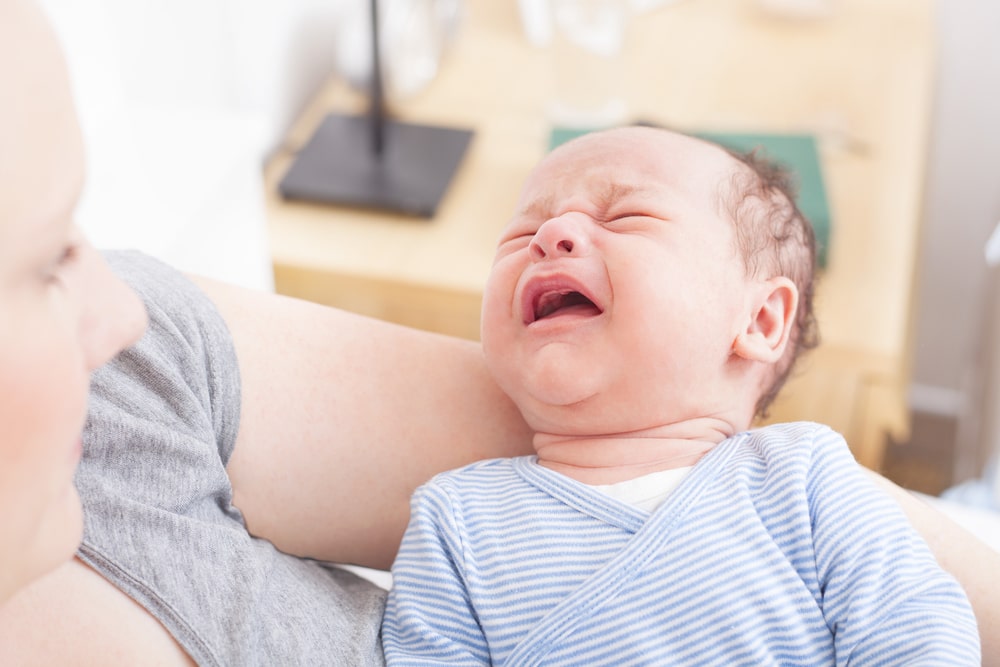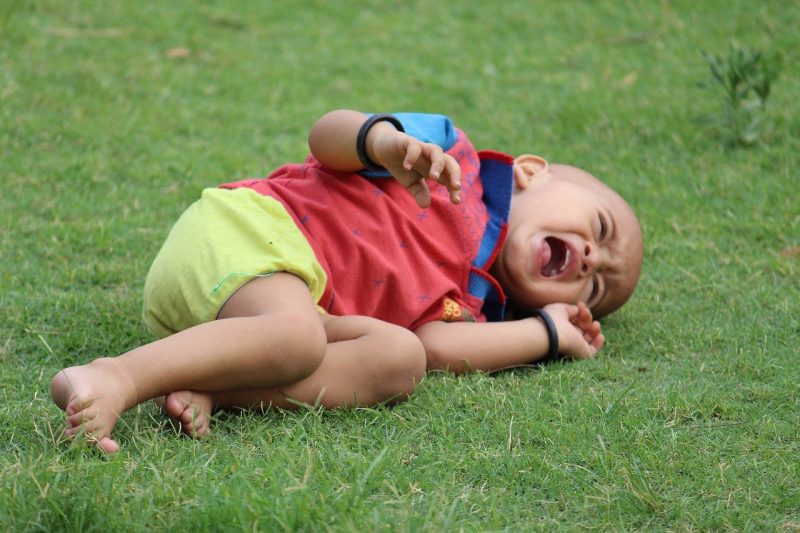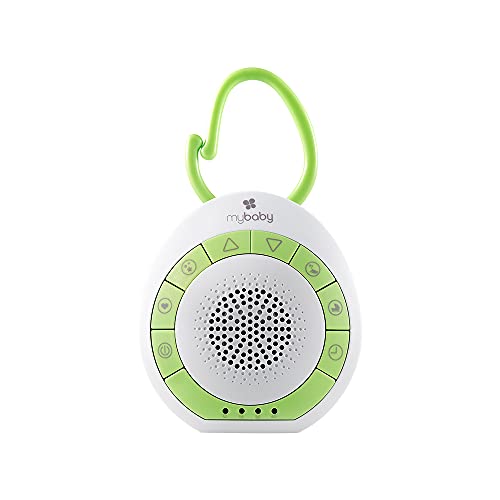Baby headbutting can be a bit alarming. If you’re anything like me, you were instantly shocked and then watched for signs of a concussion for hours on end.
I was so concerned that my baby was going to hurt herself I asked her pediatrician what to do about it, and what causes this behavior. It turns out that head butting is very common in both infants and toddlers, and it’s not always a cause for concern.
Baby Headbutting
Baby headbutting is typically when a baby under the age of 18 months starts headbutting. They aren’t quite a toddler yet, but they are starting to exhibit some toddler behaviors.
While some of the reasons that babies and toddlers headbutt will be the same, such as frustration, sometimes babies do things for different reasons.
Because of that, it’s important to note your little one’s age when figuring out why they are headbutting and how to prevent it.
Why Do Babies Head Butt?
Babies head butt for quite a few different reasons. They might be doing this because they are frustrated and it’s their way of throwing a temper tantrum. There are a few other reasons that babies will headbutt, though.
It’s Soothing
Just like toddlers headbang to self-soothe themselves, so do babies. Typically, this is their way of soothing themselves back to sleep or when they are going through something unpleasant, such as teething.
If you notice that your baby does this every night when they are going to sleep, just remember that it’s nothing to be concerned about.
They Like Your Reaction
When a baby bangs its head on something, you’re bound to react somehow. Some parents laugh because it encourages their children to laugh it off. Others might rush over to make sure their little one is okay.
If your baby likes your reaction, you can trust that they are going to keep doing the same thing as long as they keep getting the same reaction.
They Want To Touch Faces
If your baby loves to smush your faces together or rub their face against yours, this could start as a head butt. They simply don’t know that they are moving their head too fast towards yours, or that it’s painful for you. Instead, they are trying to show affection.
Your Baby Wants Something
View in gallery
Babies have fewer communication skills than toddlers, and they can’t move around freely just yet. Because of that, they try to find other ways to do things.
Your baby may throw themselves back when they want down, effectively headbutting you in the process.
They might head butt you because they are hungry, thirsty, or simply want to play. Pay attention to what makes the behavior stop, and that is what your baby is trying to tell you.
Can Baby Head Butting Hurt Infants?
If a child hits their head too hard against anything, it can hurt them. However, most babies won’t do that. This is especially true if your little one is doing this as a way to self-soothe.
If your little one does, they’ll cry. Soothe them, and watch for signs of a concussion. Signs of a concussion in babies include:
- Vomiting
- Loss of consciousness
- Excessive sleepiness
- Crying that is considered inconsolable
- Losing acquired skills
If you’re concerned about your little one, it’s important to take them to the emergency room. It’s always better to find out there is nothing wrong than to not go to the doctor when there is something wrong.
Toddler Head Butting
Headbutting is most common when babies transform from infants into toddlers. They have so many emotions and things that they want to say, yet they lack the communication skills to say them.
We can’t forget the emotions that they simply do not have the coping skills to deal with yet either. It’s surprisingly typical to see head-butting in children that starts at 18 months- 2 years.
Why Is My Toddler Head Butting?
Your toddler could be head-butting for a variety of reasons. In order to determine why they are exhibiting this behavior, pay attention to what is going on around them.
What happened before the head butting? What was your reaction to the head butting? What makes them stop? This can help you determine why they are doing it. There are plenty of common reasons that you’ll see headbutting in toddlers.
Attention
If you can’t help but notice that your toddler does this every time you’re on the phone, it could be a cry for attention. As parents, it’s natural that we want to rush over to our little ones to make sure they’re okay after bumping their heads.
View in gallery
It can also be a pretty effective way to get you off the phone faster. When little ones want undivided attention, they find the most effective way to get it, and head butting is very effective.
Frustration
It’s very common for toddlers to head butt because they have strong emotions and they do not know how to express them. This is their version of a temper tantrum.
However, instead of a full blow tantrum with kicking and screaming, some children head butt.
It’s Soothing
Both toddlers and babies might rock or headbang when they are falling asleep. The rhythmic motion is soothing to them, just like being rocked while in a rocking chair. This is nothing to be concerned about.
How To Prevent Head Butting (And What Else To Do)
In order to prevent toddler head butting, you need to determine why it is happening.
Writing down what is going on when your toddler starts head-butting, what time of day it is, etc. can help give you key insight as to what is happening. Then, you can learn how to prevent headbutting.
Ignore Attention Seeking Behavior
If your documentation tells you that this is your little one’s way of getting your attention, you can put a stop to it by ignoring the behavior. Once your child sees that this isn’t a good way to get your attention, they will stop and move on to something else.
It’s important to note that attention-seeking behavior does not stop after ignoring it one time.
Usually, kids will do the same behavior even louder to try to get your attention. Expect them to take things up a notch before quitting the behavior. With time and patience, it will stop.
Be Proactive
If your little one only starts headbutting when you’re in the middle of cooking dinner, consider setting up an area for them to play in the kitchen.
Use positive reinforcement to encourage them to play with toys. They’ll be happily distracted and less likely to head butt.
Prevent Tantrums Before They Start
View in gallery
Children of all ages are more likely to throw temper tantrums when they are hungry or tired. Maintaining a consistent schedule with your little one regarding their meal and nap times can help prevent tantrums.
If you know that your baby is going to throw a temper tantrum over a particular thing, consider avoiding it for the time being until you’re prepared to deal with the tantrum.
Offer Plenty Of Positive Attention
Sometimes, children have higher attention needs than we realize. Some children naturally have higher needs than others.
When you keep their attention bucket full via random positive attention throughout the day, it can help eliminate them using outbursts as a way to get attention.
Keep A Neutral Response
After you watch your baby slam their head onto a hardwood floor, it can be difficult to have a neutral response. However, this is important to make sure that you aren’t accidentally encouraging the behavior.
If you’re shocked, your baby might learn that you’ll always have a certain reaction when they head butt. They are also more likely to head butt again to see if you have the same reaction.
The same applies to if you shower them with attention. This is why you should try to have a neutral response when you see this type of behavior.
Provide Soft Bedding
Prices pulled from the Amazon Product Advertising API on:
Product prices and availability are accurate as of the date/time indicated and are subject to change. Any price and availability information displayed on [relevant Amazon Site(s), as applicable] at the time of purchase will apply to the purchase of this product.
If your baby headbangs in their crib, make sure that you provide a pillow or plenty of plushies to soften the blow. However, you don’t want to add so many that it’s a suffocation hazard.
Instead, limits pillows to two or three to make sure that your little one is okay, and they aren’t at risk of suffocation. Do not do this for babies that are not able to roll over and prevent suffocation yet.
Do Soothing Activities With Your Baby
This is particularly helpful if your little one headbangs in order to fall asleep at night. The theory is that they will already be soothed before falling asleep so they will have an easier time falling asleep.
My littlest used to rock to sleep every night but had an easier time falling asleep on her own when we started doing more calming things before bedtime.
While this is usually recommended during a bedtime routine, soothing activities can also be helpful during the day.
They can help prevent tantrums, calm down little ones in the middle of a tantrum, and give your baby plenty of positive attention. Soothing activities you can try include, but aren’t limited to:
- Singing your baby a song
- Reading stories
- Listening to quiet music
- Rocking your baby
- Cuddling in front of your favorite movie
- Slow dancing to your favorite song
- Playing quietly
Anything quiet that your baby enjoys counts as a soothing activity. This could include a bath or simply enjoying some cuddle time together.
Prices pulled from the Amazon Product Advertising API on:
Product prices and availability are accurate as of the date/time indicated and are subject to change. Any price and availability information displayed on [relevant Amazon Site(s), as applicable] at the time of purchase will apply to the purchase of this product.
When Should You Be Concerned About Head Butting?
Most parents are concerned about head butting when they first see it. They worry that their baby will hurt themselves or someone else. Most of the time, this is nothing to be concerned about. You should worry if:
- There are signs of a concussion
- Your little one is also developmentally delayed
- There are signs of abnormal social interaction
- You are having a hard time understanding the reason behind the headbanging
If you nodded your head to anything on the above list, you should contact your pediatrician. Even if the headbanging is normal, they can give you further advice on what to do in your specific situation.
Headbutting And Autism
One of the main concerns that parents have with headbanging is autism. This is understandable. Headbanging is typically associated with a child being on the Autism spectrum.
However, headbanging alone is not enough to signal that a baby or toddler more than likely has autism. Your doctor will also look for other signs of autism.
Signs of autism in babies include, but is not limited to:
- Speech delays
- Not responding to hearing their name
- Avoiding eye contact or not making eye contact
- Lack of facial expressions
- Little or no gesturing or pointing at things
Typically, children will not show signs of autism until they are older, such as 12 months. However, there are always exceptions. Infants as young as 9 months have also shown signs of autism.
View in gallery
Some parents have noted that their babies were showing signs at ages younger than 9 months, but this is uncommon.
Most doctors will look more thoroughly for signs of autism in children 12-24 months of age and beyond. Common signs of autism in toddlers include:
- Repeated motions, such as rocking, hand flapping, or consistently saying the same word
- Little or no eye contact
- Delayed speech
- Difficulty following simple instructions
- Shows no interest in playing with other children
- Does not play with toys as others, such as lining up toys instead of playing with them
- Does not speak at all
- Unexpected reactions to sounds or events
- May have increased difficulty managing their emotions
If you’re concerned that your little one has autism, it’s important to contact your pediatrician. They can then refer you to a developmental pediatrician that specializes in disorders like autism if they suspect that your child is on the spectrum.
In Conclusion
Headbanging is frequently seen in both infants and toddlers. Typically, it is nothing to worry about.
It generally goes away on its own as children become better at communicating their wants, needs, and feelings. If you are concerned about this behavior, contact your pediatrician.








